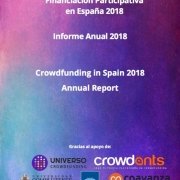Current State of Crowdfunding in Sweden 2016
An overview

Inhabitants: 9,8 million
GDP (ppp) per capita: $47,319
(Source: Wikipedia; Image Credit: NuclearVacuum)
In 2015, crowdfunding in Sweden after leaving its niche from being somewhere in the corner of entrepreneurial finance, where it started in 2011, went mainstream. By 2016 Swedish entrepreneurs could not only choose from at least seven local platforms but also from a range of business models and nearly all types of crowdfunding. Closing campaign rounds in amounts of €800.000 in Equity crowdfunding would have been impossible two years ago.
Volumes
The numbers below provide a preliminary indication for the volumes raised in the Nordic countries in 2014 (source: The European Alternative Finance Report, University of Cambridge, 2015)
- Donation-based Crowdfunding: €0.1million
- Reward-based Crowdfunding: €9.1million
- P2P consumer lending: €87 million
- P2P business lending: €28,4 million
- Equity-based crowdfunding: €3,7 million
(NB: data collected by Michal Gromek, based on platforms indicate that €14 million equity was raised in the time period Q4 2014 – Q1 2016).
Local platforms
FundedByMe.com (equity + P2P consumer lending) was launched in 2011.
Toborrow.se (P2P lending) started in 2013 and is available for C2B as well as B2B.
Crowdculture.se, Takespace.se and Agreatday.tv is a donation based platform. Agreatday has recently removed the rewards part and operates only in donations.
Tessin.se (2014) is a real estate crowdfunding platform.
Trustbuddy.se (P2P lending) filed for bankruptcy in 2015.
Foreign Platforms
Invesdor.com from Finland, an equity-based platform founded in 2012
CrowdCube.com from the UK (equity-based crowdfunding)
Indiegogo and Kickstarter are the most well know reward based crowdfunding platforms.
Regulations
Crowdfunding has still no legal definition in the Swedish regulations. Its regulation is allocated in different sections of the legislation, which has been created a long time before the FinTech age. In the recent publication on Crowdfunding by the Swedish Financial Authorities (Finansinspektionen) it has been pointed out, that under certain circumstances it is even unclear which public authorities should execute supervision on crowdfunding.
Due to a lack of regulation of equity crowdfunding for private limited liability companies on platforms without MIFID license is very complex. The Swedish Private Limited Liability Company called Privat Aktiebolag – is one of the most popular SME companies type for legal entities in Sweden. Privat AB companies can not advertise their desire to sell shares to the public and can’t take in more than 200 new shareholders in one share issue.
For potential investors to view financial information, business plans or financial forecast of a Privat AB during an equity-based crowdfunding campaign on a Swedish platform without a MIFID license, the platform requires the user to become an “exclusive member” while signing up even with social media accounts. After loging the “exclusive member” , has access to full information provided by the company. The platform does not advertise any offerings from Privat AB companies – it informs about the fact that the project seeks to fund. (Being informed about a share issue process is not considered advertisment.)
One of the leading platforms blocks the share issue process once the 200 investor limit is reached. If the company would like to continue to raise funding, the Privat AB board has to make a decision to issue shares for a second or third time. In this way, the regulation of an intake of 200 investors can be enforced.
Banks & Investors
Within the next upcoming 18 months, a close cooperation between Swedish crowdfunding platforms and banks is expected. Until now Swedish banks express a particular “love-hate” relationship with the platform operators. The banks in Sweden are aware of the changes caused by FinTech and crowdfunding in particular, but still have decided not to follow other traditional financial institutions in the UK or the USA, which already cooperate with platforms since years.
“In 2016 the crowdfunding industry in Sweden should continue to grow exceeding the European average. Despite very impressive growth rates on paper. all Swedish crowdfunding platforms combined will not originate more loans or provide more equity to Swedish companies in a year, than a big Swedish bank pays out on loans during a business week” – mentioned one of the Swedish bank executive during a personal interview. The question that arises from it, is how big does Crowdfunding have to be to partner-up with a Swedish bank?
Employees of crowdfunding platforms expressed that banks in Sweden use the ”low-volume-argument” for delaying cooperation with crowdfunding platforms. The more pressing issue is the lack of transparent and proportionate legislation, adapted to a digital industry. Even the Swedish Financial Supervision informs that the supervision responsibility is unclear in Sweden, so it is hard to that the banks will take compliance risks
Our expert

It is high time for public authorities in Sweden to define Crowdfunding by law, create a national discussion forum and lead us out of this medieval dungeon of shady legislation
The Current State of Crowdfunding in Sweden is made possible by the contribution of Michal Gromek
What is the potential of crowdfunding in your country?
There are approximately 90.000 SME companies with nearly €99 million unfulfilled financial needs per year, which could use crowdfunding to close their financial gap. 99% of the enterprises in Sweden are SME’s and they account for nearly 2.1 million employees, which is 65.8% of total employment. SME’s are creating four out of five new jobs in Sweden. According to a report on SME performance from the European Commission, the SME companies in Sweden are nearly 50% worse in delivering new-to-market ideas than EU average. The country lacks in public aid for business compared with other EU countries.
What is the biggest challenge?
A recent report from the Stockholm School for Economics has indicated that Stockholm is being considered as the European Fintech Hub number two just after London. 32% of Sweden’s total €826 million in investments in private companies in 2014 has been conducted in the fintech sector. Despite the growing importance of FinTech, the amount of attention from the public side, can be considered as insufficient. Additionally, Sweden has not followed the developments of neighbouring country Denmark, which has already established the Crowdfunding Association. The latter has received public grants for various activities. The authorities there use crowdfunding as a “social proof” before paying out grants to startups.[1]
As stated by Dr Rotem Shneor from the Nordic Crowdfunding Alliance: “Despite significant growth, crowdfunding as a concept remains relatively unknown and/or unclear to the majority of the public in the Nordic countries, a situation also prevalent among players in local entrepreneurial ecosystems.”[1]
What is the future holding for Sweden?
In soon future we should see a more extensive interconnection between crowdfunding and traditional financial actors. In 2015, crowdfunding companies have extensively worked on a range of partnerships with business angels, incubators and external providers. This trend should continue and benefit the entrepreneur with an increased amount of service. Since 2009 Venture Capital fund managers have pulled back from financing early stage ventures, what until today empowers crowdfunding and will continue.
If I were asked to predict the future of the banking industry cooperating with crowdfunding platform, I would argue that once at least ONE of the Swedish banks will decide to launch a partnership with a platform at least 60% of the banks will follow within 18 months.







